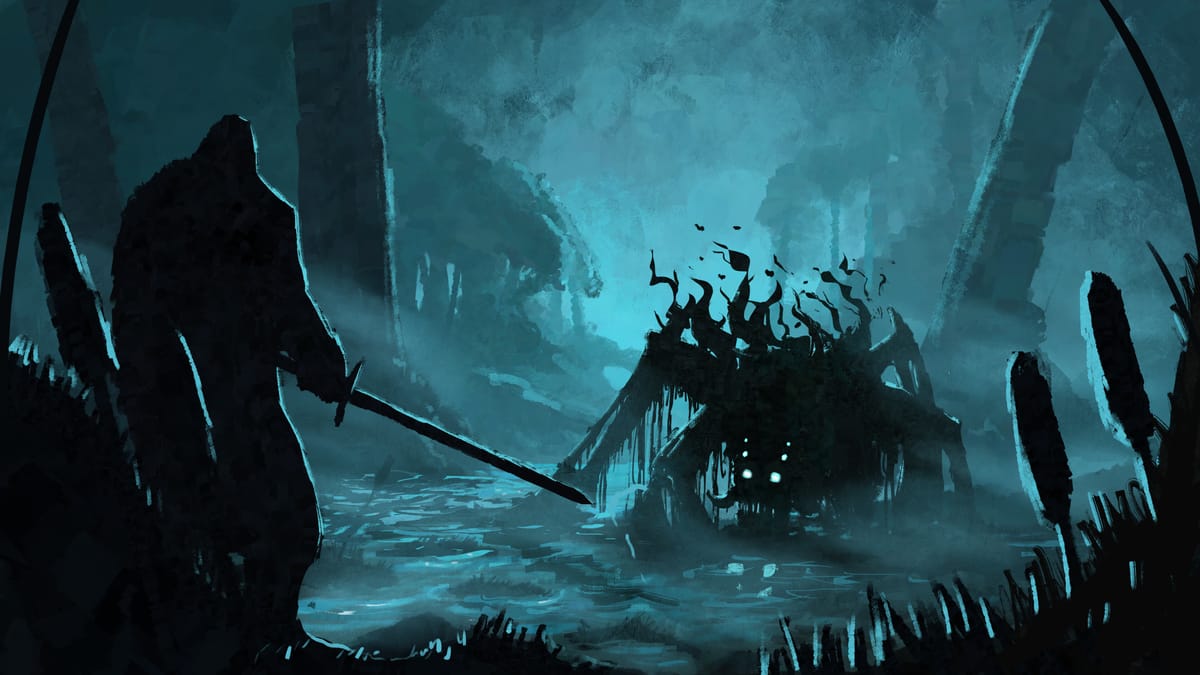The Player Principles: An Adventurous Mindset

One of the most common features of PbtA design are GM Principles, which provide GMs with the core foundations that guide running PbtA games. Many new PbtA GMs, coming from traditional TTRPGs, are surprised by these, as the games they usually run probably have never explicitly stated what are the guidelines they’re supposed to follow—less so in such a concise and straightforward manner, one that’s easy to reference and use at the (virtual) table.
That was my experience when I discovered the original Apocalypse World back in 2014! I became immediately fascinated by GM Principles, and I use them in even microTTRPGs, as they can contain, in a few short sentences, the game designer's vision for the GM's role in the game.
But what about the rest of the players? Those who usually outnumber the GM 3- or 4-to-1? How should they act in the designer's eyes? What should they prioritize?
Player Principles, in contrast, aren’t that common. I’ve seen them very sparsely—the first time in the wonderfully-written and endlessly-inspiring Monsterhearts (MH) by Avery Alder—and very few PbtA games I’ve read, played, or run since then make an explicit mention of them or spotlight them as much as MH did.
I was pleasantly surprised when I discovered Spencer had included them in Chasing Adventure so, in one of our first design meetings, back in November 2024, we agreed that Dungeon World 2 (DW2) could greatly benefit from having them.
So, here are our proposed Player Principles for DW2:
- Be a team player
- Connect with the world
- Explore the characters
- Roll with the punches
- Take exciting risks
The idea of these is that they’ll be prominently featured at the top of each Playbook/Class in the final layout, to remind players of the game’s general expectations.
Below is each principle explained in greater detail with some additional comments I've added.
Be a Team Player
Everyone at the table is working together to tell a collaborative story. Even when your characters are separated or fighting each other, you as players are on the same team, so try to be a good teammate.
Before starting or continuing an extended scene on your own, such as a Rogue sneaking off to steal something, check with the others to see if they want the spotlight for a bit.
Before significantly harming or altering another PC or something important to them, check if their player is okay with it.
Make sure everyone has a chance to speak. Group dynamics are hard to navigate, and some people can unintentionally be louder or pushier than others. Listen intently and don’t interrupt someone else, and check in with someone if they haven’t spoken up in a while.
Treat each other with value and dignity, and respect set boundaries. If the Cleric’s uncle passing away tragically would make the game less fun, then work together and search for another consequence.
We’ve said before that one of the main things we want to reinforce with DW2’s design is the idea that this is a group game. Outside of the fiction—but deeply embedded in the conversation—is the idea that the players are working together, no matter what. Even when the PCs are separated, at odds with each other, or even fighting against one another (with everyone’s enthusiastic consent, of course) they still should be collaborating to have a good time at the table.
This also includes being conscious of sharing the spotlight with other players, incorporating them in your roleplaying whenever possible, and avoiding all the disruptive behaviors as a player.
Connect With the World
Don't be a lone wolf. Attachments are interesting and often serve as compelling motivations. Anchor your character's past to particular places, people, or events. Build relationships with each other: admiration, competition, protectiveness, authority, family, romance, ideology, and loyalty are just some aspects of relationships.
Never get along with everyone, and never get along with no one. Some people might just rub you the wrong way, while others might be the few you open up to.
The fictional world is created by all the players. Although at some tables some GMs may have more to say about the setting, that doesn’t mean you cannot contribute if you’re another player. Indeed, you can add a lot of value by connecting your PC to the setting, by coming up with interesting NPCs for your Backstory, and by establishing interesting relationships with places, situations, and other elements in the fiction.
Explore the Characters
Express your character's thoughts, feelings, and motivations. Start with a simple character concept, then develop nuances or reveal details over time.
Get invested in each other's characters, for better or for worse, and develop thoughts and opinions about them. What aspect of another character might inspire, anger, enamour, or worry yours?
Ask each other questions, and open up when asked in return. How would a character shine at their best, and what might they break at their worst? What fears, doubts, or secrets might someone harbor? What beliefs or goals drive them to behave the way they do? How might they change in appearance, behavior, or motivation?
This includes your character as well as the other players’ and the NPCs. Taking an active interest in developing characters beyond their functionality is one of the key ingredients in creating a fascinating fiction at the table.
This doesn’t mean we expect players to come up with elaborate backstories—quite the contrary. In fact, we encourage people to discover their characters while playing. A lot of the mechanics we’ve designed offer you suggestions that should help you discover who your character is. After all, play to find out applies to all the players, not just the GM!
Roll With the Punches
When your sword breaks in a fight, you swing with your fists. When you fail to save the prince, you chase down his assassin. When your beloved village lies in ruin, you pick up a hammer and start rebuilding.
A clean success is rare; instead, it's often mixed with failure and cost. But failure is not the end, only a new beginning.
If you lose something, be it a person, a possession, or an opportunity, then you have the chance to decide and discover how your character deals with the loss.
A lot of bad things can happen during an adventure, especially whenever your GM makes a hard move. When those moments come there’s a big temptation to try to negotiate, to attempt to circumvent the bad thing happening, or simply to do something immediately to overcome it.
In fantasy stories, however, when the protagonists are confronted with similar situations they usually just roll with the punches. The enemy breaks their sword? They fight with the remnants or use their fists. Magic disrupted? Time to try that crossbow you've been carrying.
Because the PCs can use Resistance to say "no" a limited number of times, this principle also encourages them to think critically about how and when they use it. Sure, the fighter losing a limb is terrible, but if they're still the most dangerous person in most rooms then wouldn't that make them even more awesome?
That sort of “grace under pressure”, so to speak, is something fundamental to have a good time regardless of the result of your character’s actions. If not, you’re guaranteed to get frustrated; sometimes the dice just go poorly all night.
Take Exciting Risks
Safety and patience are for ordinary people, and rarely make for interesting adventures. Your character shines brightest when balancing on the sharpest edges. Act decisively in the moment, pursue incredible accomplishments by the skin of your teeth, and act on the opportunities that arise. Keep complex plans and preparations offscreen or in flashbacks.
Characters are easy to bruise but hard to break. Even when in mortal danger, your character will only die when you risk it or choose it. That doesn’t mean they can’t lose; they can still be knocked out, trapped, captured, or worse. Unlike death, which often represents an unwilling end to a character, these kinds of consequences keep the narrative tension going and ask "how do we get out of this?"
Playing cautiously is a perfect way to not have fun. The conversation and fiction get way more interesting when you put your character in dangerous situations because, well, that’s what the character would do in that situation. That means saying the wrong thing, attacking the wicked elven guard even if you’re outnumbered and outmagicked, or drawing enemy fire.
Doing these things may put your character at risk, it’s true, but it may also provide you and the rest of the players with lots of fun—and perhaps indelible memories of your fictional adventures together.
It also means creating characters who would consistently and believably take those risks over the safe options. Careful is rarely interesting when it comes to fantasy adventure.
So that’s for Player Principles! Some people asked for them and we thought it’d be good to share them with you all before resuming our Class previews for the Alpha Playtest. Speaking of: Spencer will be back on Friday to show you our current Fighter design.
Until then, happy gaming!
Helena
